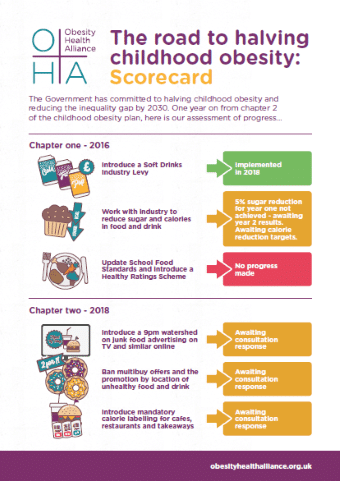25th June 2019
86% of public say childhood obesity is a ‘serious problem’ as leading health campaigners warn faster progress is needed to protect children from health risks of obesity
One year on from the publication of the Government’s landmark childhood obesity plan: chapter 2, the Obesity Health Alliance (OHA) has issued a scorecard to assess the progress, with the majority of vital policies stalled at the amber lights.
Childhood obesity continues to be a key priority for the public. ComRes polling data among 2,058 adults in Great Britain shows:
- 69% agree the new Prime Minister should continue to prioritise reducing childhood obesity
- 86% agree childhood obesity is a serious problem
- 76% say they are supportive of government action to reduce levels of childhood obesity
- 80% say they are worried about the impact of obesity on NHS resources
The Obesity Health Alliance (OHA), which is made up of over 40 leading health charities, medical royal colleges and campaign groups and includes the Institute of Health Visiting, recognise the work that been done by the Government in the last year, despite a complex political environment. But they warn that faster progress is needed in order to have any chance of meeting the Government’s target of halving childhood obesity by 2030.
The Institute commented:
Health visitors are in an ideal position to promote healthy weight, healthy nutrition with all families with babies and pre-school children. However, the current variation in capacity and service models has led to many families not receiving this support. Without in investment in front-line provision such as health visiting, childhood obesity will continue to be a serious public health problem.
Lack of consistent advice on healthy weight and nutrition in the early years has been compounded by closure of child health clinics across England where parents and carers would previously have been offered support and guidance from their health visiting service. The iHV calls for urgent action to consider the impact of the current closures and cuts to front-line health visiting services.
The most recent trends in life expectancy in England present a slowdown in the reduction of mortality rates for heart disease and stroke, which are strongly associated with being overweight and obesity. It is therefore a serious concern that there is a stall in the reduction of childhood obesity. Our children are our future and without investment in front-line public health services like health visiting, as part of a whole system approach to tackle childhood obesity, we will continue to see life expectancy fall for those in the most deprived parts of our society.








